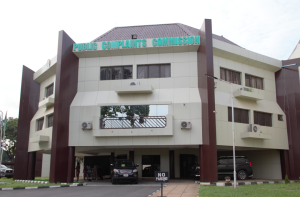About Public Complaints Commission
 The Public Complaints Commission is the machinery for the control of administrative excesses (non- adherence to procedures or abuse of law). It is an organ of the government set up to redress complaints lodged by aggrieved citizens or residents in Nigeria against administrative injustice.
The Public Complaints Commission is the machinery for the control of administrative excesses (non- adherence to procedures or abuse of law). It is an organ of the government set up to redress complaints lodged by aggrieved citizens or residents in Nigeria against administrative injustice.
The Commission aims at promoting social justice for the individual citizen. It is also to provide a viable option for Nigerians or anyone resident in Nigeria seeking redress against injustice arising from administrative bureaucratic errors, omission or abuse by officials of government, or limited liability companies in Nigeria.
The Commission also has the role of improving public administration in the laws, procedures, practices, rules and regulations and standard behavior of officials. These are provided for in the ACT, CAP 37 LFN 2004.
The primary function of the Public Complaints Commission is to provide impartial investigation on behalf of the complainants who feel aggrieved by the action or inaction of the government or local government or private companies.
The Commissions investigation department is divided into 4 sections each handling a specific area. These are:
The Commission is independent of government bureaucracy and at the same time has extensive powers regarding confidentiality and access to all government information including the production of documents which can aid the Commission’s investigation, The Commission is empowered to enforce compliance in order to obtain the necessary information. This power is vital to the Commission in facilitating impartial investigation in order to arrive at a fair and equitable decision. Investigation of all complaints are provided at no cost to both the complainant and respondent i.e. citizen and non citizen resident in the country and their complaints are treated with the confidentiality they deserve. The commission has enabled it’s staff to handle all complaints speedily.
Objectives of The Public Complaints Commission
The Commission aims at promoting social justice for the individual citizen. It is also to provide a viable option for Nigerians or anyone resident in Nigeria seeking redress against injustice arising from administrative bureaucratic errors, omission or abuse by officials of government, or limited liability companies in Nigeria.
The Commission also has the role of improving public administration in the laws, procedures, practices, rules and regulations and standard behavior of officials. These are provided for in the ACT, CAP 37 LFN 2004.



